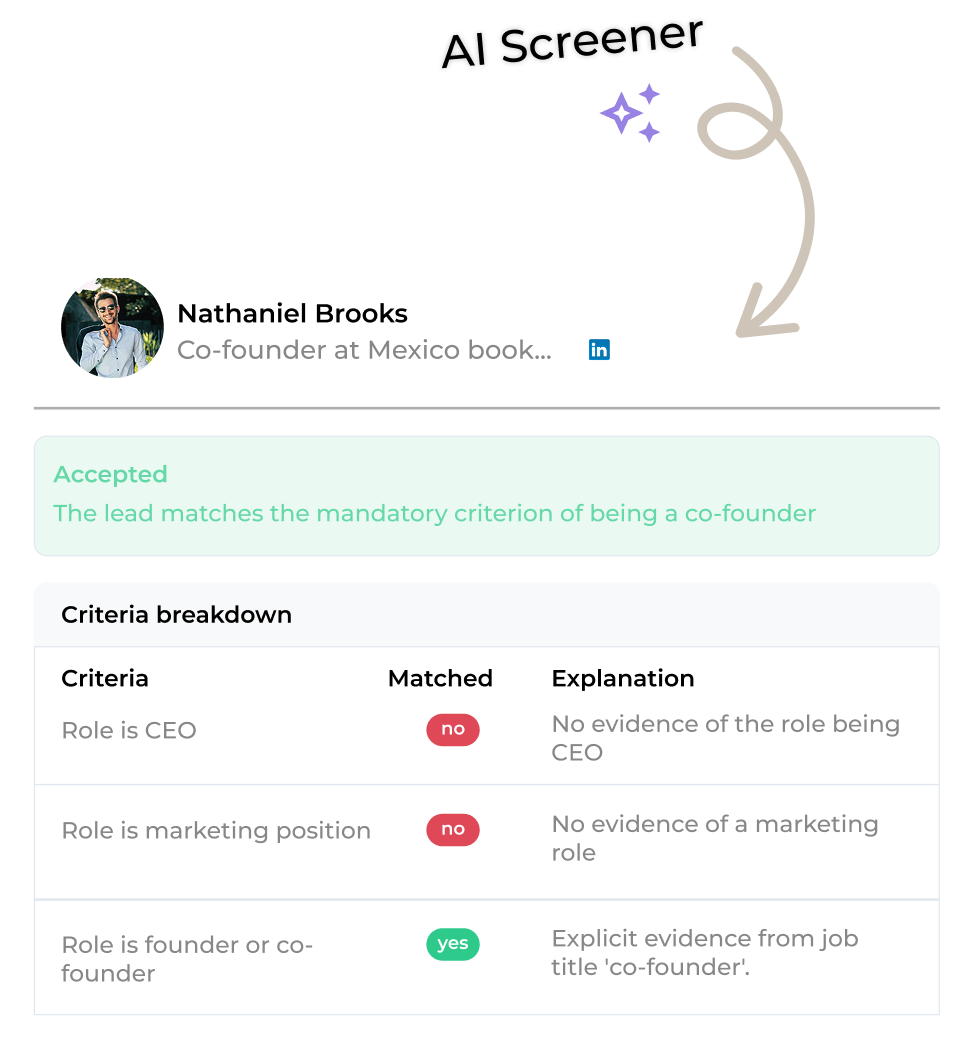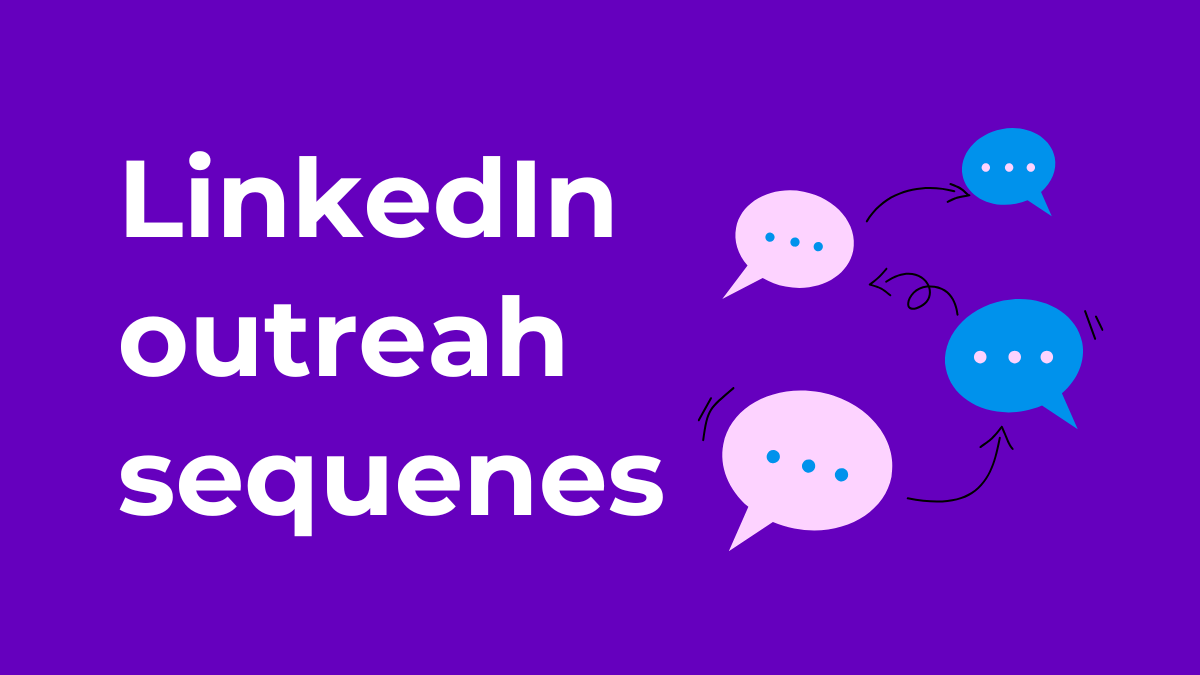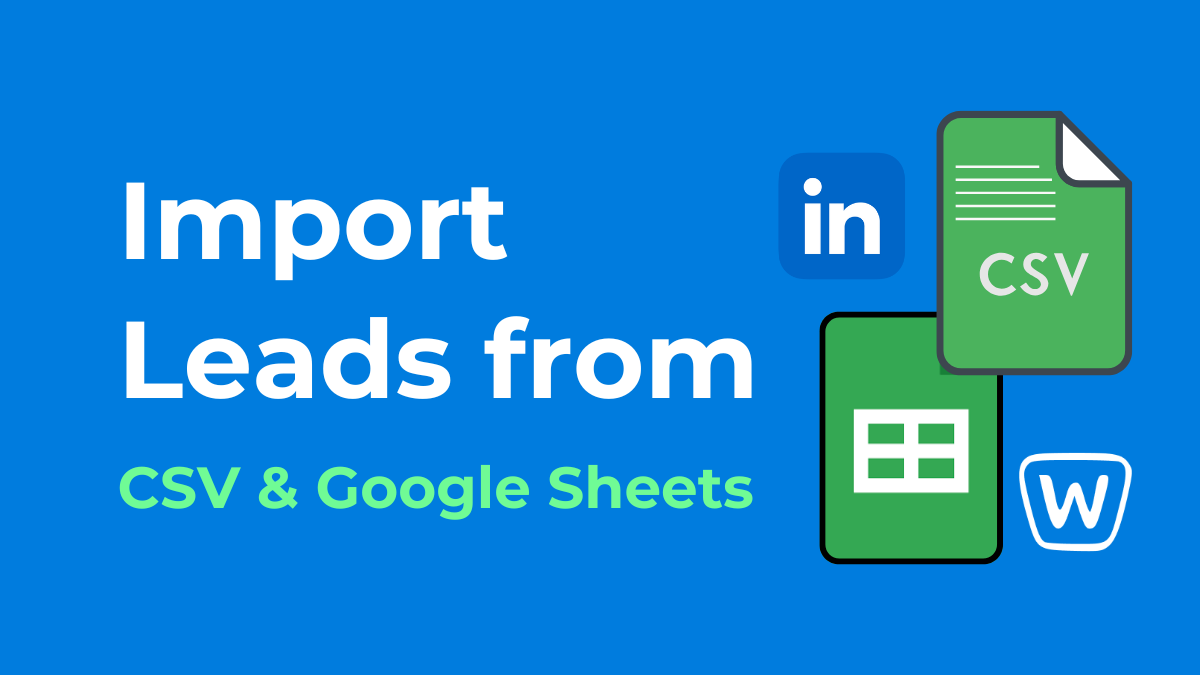00
Days
00
Hours
00
Minutes
00
Seconds
Automated LinkedIn messaging is all about using software tools to prospect and send messages on LinkedIn without doing it manually each time. These tools can be set up to send connection requests and personalized messages at scale, as well as perform other automated actions depending on the features offered by each platform.
The main goal of automation is to boost efficiency in outreach, allowing users to connect with a larger audience in less time. However, it’s important to know that using these tools comes with implications for business networking especially in a space where personal connection and credibility carry a lot of weight.
Let’s say you want to start generating leads on LinkedIn.
You already know who your target audience is and you’re ready to reach out.
You have two options: do it manually (searching profiles one by one, visiting each page, sending connection requests, and writing personalized messages) or automate the process.
After an hour of doing it manually, you’ve probably made little progress.
Fortunately, there’s a smarter and faster way to do it: LinkedIn automation tools.
Automated LinkedIn messaging offers several advantages:
Automation helps you save time by handling repetitive, time-consuming tasks such as visiting profiles, sending invitations, or following up with prospects.
This allows sales teams and professionals to focus on what really matters: building relationships and closing deals.
Automation tools allow you to contact and maintain consistent communication with a much larger number of prospects without losing quality or personalization.
This consistency keeps your profile active, your brand visible, and your pipeline growing — even when you’re not online.
Personalization is what makes the difference between an effective message and one that gets ignored.
Modern platforms allow you to use personalization variables such as {first_name}, {last_name}, {job_title}, and {company_name}, making every message feel more human and relevant.
Others, like WaLead.ai, go one step further. They let you generate as many variables as you want (based on your database fields), allowing for an even higher level of customization.
What truly sets WaLead.ai apart is its AI-powered message generation. Using a simple prompt, the AI can visit your prospect’s profile, access their website, read their latest post — and then create 100% personalized, natural, and context-aware messages for each contact automatically.
Most automation tools include analytics and performance tracking features to optimize your campaigns, turning LinkedIn into a scalable and measurable growth channel.
You can analyze which messages perform best, which audience segments are more responsive, and how to continuously improve your outreach based on real data.
Despite the benefits, there are significant risks with automated messaging.
While automation can help scale your LinkedIn outreach and save valuable time, using it incorrectly can lead to serious problems such as account restrictions, poor engagement, or even damage to your brand reputation.
Below are the main challenges to consider when using automated LinkedIn messaging:
LinkedIn closely monitors automated activity. Sending too many messages or connection requests in a short time can trigger LinkedIn’s safety systems and result in temporary restrictions or permanent bans.
Automation tools that act too aggressively may also violate LinkedIn’s terms of service, putting your account and data at risk.
If you’re wondering how many connection requests you can safely send per day, check out our article How Many Connection Requests Can You Send on LinkedIn Per Day — it explains safe limits and how to avoid triggering LinkedIn’s automation filters.
When messages sound robotic or repetitive, recipients are less likely to respond. Generic or duplicated messages can make your outreach feel impersonal and reduce the effectiveness of your campaigns.
If automation is not configured properly, your messages might reach the wrong audience.
Sending irrelevant or mistargeted messages not only wastes time but can also harm your professional image and decrease your response rate.
To navigate the risks associated with automated messaging successfully, users should follow these best practices.The goal is not only to automate but to do it intelligently, maintaining human, relevant, and effective communication that drives real results.
Avoid generic or repetitive templates.
Personalization is the key factor that determines the success of any automated outreach strategy.
Use dynamic variables such as {first_name}, {company_name}, or {job_title} to tailor each message to your recipient.
AI-powered tools like WaLead.ai go one step further.
They allow you to send AI-generated messages or use personalized variables, depending on your preference:
Result: more human messages → higher response rates → more sales.
.png)
Automation is only effective when directed at the right audience.
Before launching a campaign, clearly define your ICP (Ideal Customer Profile) — including industry, role, company size, and LinkedIn activity level.
You can build your database using tools like Apollo.io, Clay, or Phantombuster, and then filter it directly within WaLead.ai to identify the leads that match your ICP.
With the AI Screener, WaLead.ai automatically evaluates whether each lead fits your defined ICP. For example:
My ICP is a SaaS company based in Spain, with a Marketing Director who has posted on LinkedIn in the past 60 days.
This ensures that your outreach is always targeted and relevant, avoiding wasted efforts and improving your conversion rates.

Automation should never be a “set it and forget it” process.
Track your campaign results, run A/B tests with different message versions, and analyze performance data to identify what works best.
Review which messages generate higher engagement, which audience segments respond better, and how you can adjust your approach for continuous improvement.
Also, always avoid sending too many messages or connection requests in a short period to keep your account safe.
By measuring and optimizing continuously, your LinkedIn automation will become more efficient, scalable, and sustainable over time.
%20(1).png)
Deciding whether to use automated LinkedIn messaging depends on various unique factors. Businesses should balance the efficiency and scalability benefits of automation with the risks of being perceived as spam and the necessity to follow LinkedIn's policies.
Understanding your target audience, industry norms, and overall business goals can help guide this choice. For organizations that prioritize building genuine relationships, a more measured approach to automation may lead to better long-term results.
By adhering to best practices and being aware of potential pitfalls, organizations can determine if automated messaging aligns with their networking and business growth goals while maintaining a credible and professional presence on LinkedIn.
.png)
.png)
Industries focused on lead generation, recruitment, and B2B services often benefit the most due to their reliance on outreach.
You can measure effectiveness through metrics such as open rates, response rates, and engagement levels provided by your automation tools.
Popular tools include LinkedIn Sales Navigator, Dux-Soup, WaLead.ai and Phantombuster which can help streamline your outreach efforts.
It depends. Platforms like WaLead.ai use prompts and profile data to create highly customized messages, improving engagement and response rates.

How to build effective LinkedIn outreach sequences that boost replies and drive more qualified leads

Import leads from CSV or Sheets into WaLead and run scalable, automated LinkedIn outreach campaigns.
Get step-by-step tips for using activity timelines and status updates on LinkedIn
.png)